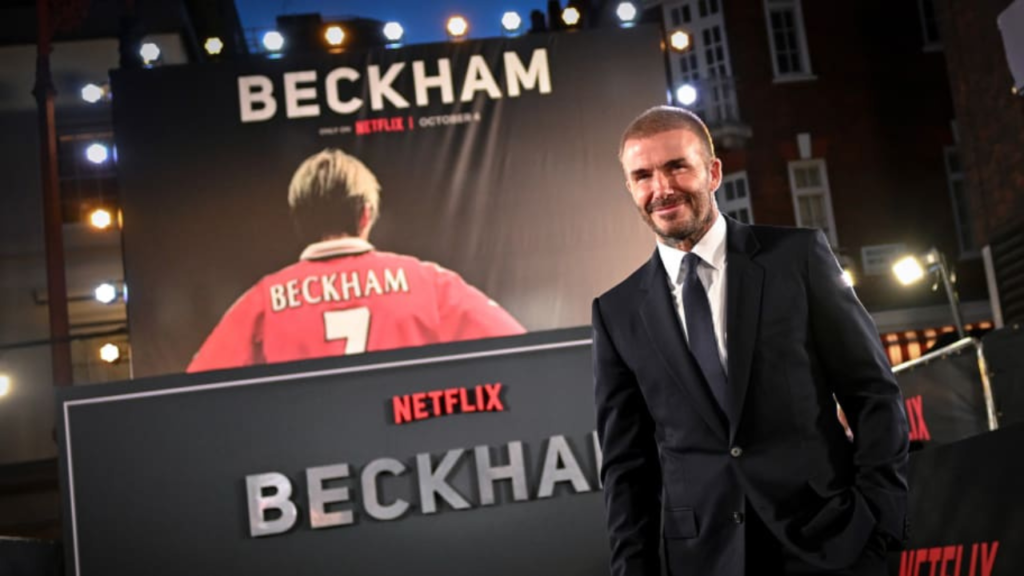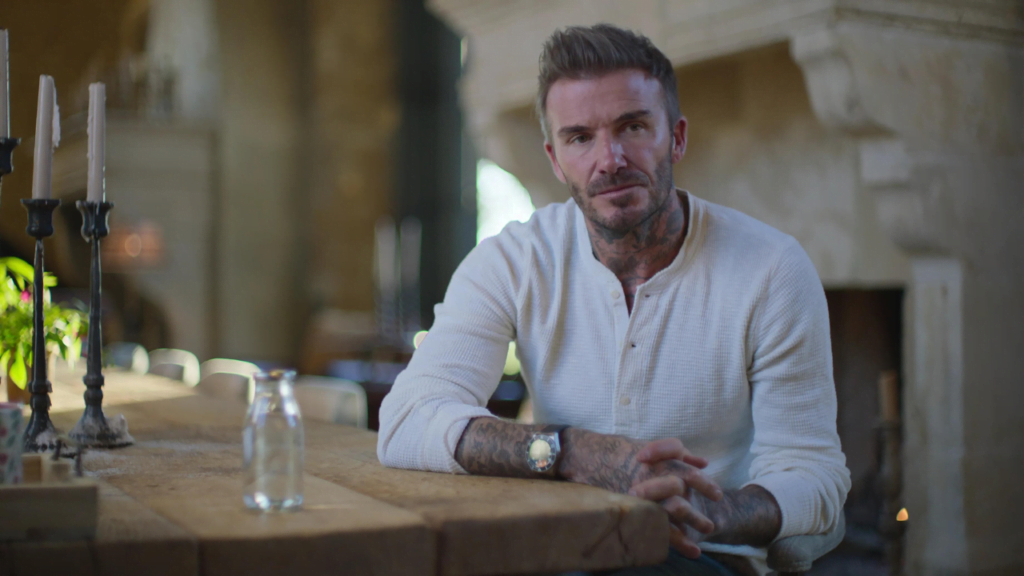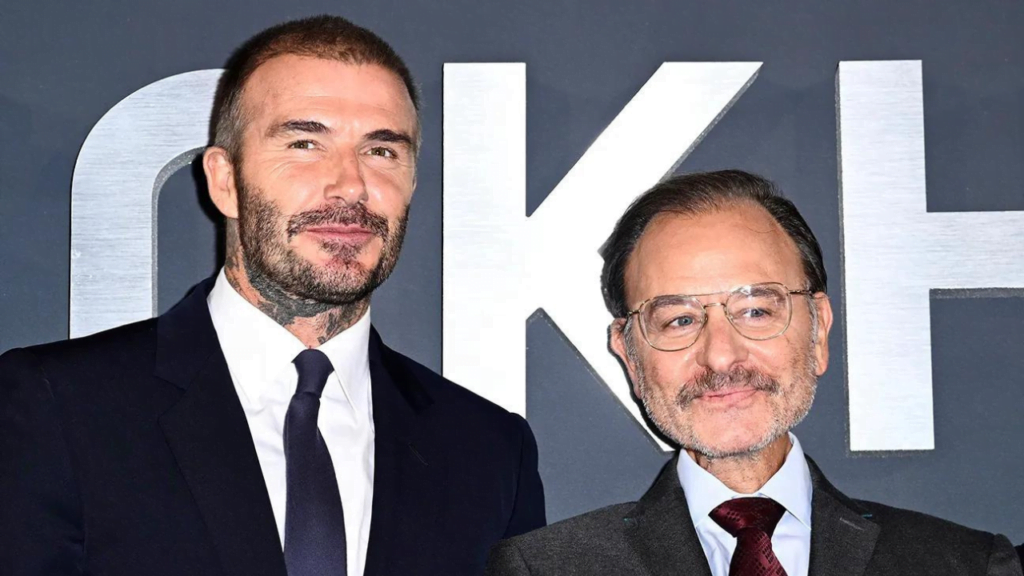Introduction :
David Beckham’s Netflix documentary, titled “Beckham,” offered fans an unfiltered look behind the curtain at one of the world’s most iconic athletes. With critical acclaim and an Emmy award to its name, the documentary is a triumph in storytelling, balancing Beckham’s legendary soccer career and the emotional trials of his personal life. Yet, as Beckham himself admitted, he “hated almost every moment of making it.”
What led Beckham to hate the very project that has brought his journey into sharper focus? Let’s dive into the details behind this four-part documentary that made fans excited while making Beckham himself deeply uncomfortable.

The Struggle to Relive Past Traumas
Why David Beckham Was Nervous About the Documentary
The documentary, which spans Beckham’s entire career—from his early days at Manchester United to his final games with Paris Saint-Germain—was no easy undertaking. Beckham confessed to Variety that the project filled him with anxiety, mainly due to the need to confront and relive his most difficult personal and professional moments. It wasn’t just Beckham who felt nervous—his wife Victoria Beckham shared those concerns.

The Pandemic’s Role in Beckham’s Decision
Interestingly, the global pandemic played a pivotal role in Beckham agreeing to make the documentary. He revealed that the rise of documentaries during the pandemic, coupled with the approach of his 10-year retirement anniversary, made him consider telling his story in this format. However, despite the timing, Beckham wasn’t initially ready to face the spotlight on his life’s most challenging episodes.
The Making of “Beckham”
Studio 99’s Role in the Production
While the documentary put a spotlight on Beckham, it was produced by his own production company, Studio 99. This gave him some level of control, but surprisingly, Beckham chose not to exercise it fully. Instead, he trusted the creative vision of his chosen director, Fisher Stevens, whose name was recommended by none other than Leonardo DiCaprio.
The Search for the Right Director
Beckham didn’t want a director who would sanitize or glamorize his life. He was looking for someone willing to dig into the raw and uncomfortable aspects of his story. Fisher Stevens, renowned for his ability to bring out the tough truth, was the perfect choice. Beckham knew Stevens would make him feel uncomfortable—and that was exactly what he needed for an authentic portrayal.

The Emotional Toll of Reflecting on the Past
Beckham’s Reluctance to Relive His Toughest Moments
Although Beckham ultimately loved the finished product, his discomfort bubbled from having to relive some of the most painful moments of his life, both on and off the pitch. From his time at Real Madrid to personal scandals, Beckham had to confront memories he would have rather left in the past.
The Rebecca Loos Affair Controversy
One particularly sensitive topic that many expected to feature in the documentary was Beckham’s alleged affair with Rebecca Loos, his former assistant. The scandal broke in 2004 when Loos claimed they had a four-month affair, which Beckham forcefully denied, calling the rumors “ludicrous.” Despite the controversy, the documentary chose not to dive deeply into this aspect, leaving some viewers curious and critics unsatisfied.
Trusting Fisher Stevens with His Story
Letting Go of Creative Control
Despite being at the center of the documentary, Beckham chose to relinquish much of his control over the final product. He didn’t review any cuts, edits, or footage throughout the entire process, allowing Fisher Stevens to craft the story without interference. This decision speaks to Beckham’s desire for authenticity, even at the cost of his own comfort.
The Art of Vulnerability
Beckham’s decision to trust Stevens and step back from the creative process mirrors his personal journey of vulnerability. While most celebrities crave control over their narratives, Beckham let the story be told from an external perspective, which allowed for a more nuanced and balanced portrayal of his life.
A Closer Look at Beckham’s Soccer Legacy
The Rise of Beckham at Manchester United
The documentary traces Beckham’s rise to international stardom, starting with his days as a young talent at Manchester United. His time at United shaped him into the soccer legend the world would come to know. The pressure, the glory, and the relentless pursuit of perfection are central themes explored in the film.
The Global Superstar: From England to Paris Saint-Germain
The documentary also follows Beckham’s career trajectory beyond Manchester United, including his brief time with Real Madrid, LA Galaxy, and his final games at Paris Saint-Germain. Each chapter in his soccer career is a testament to his unwavering dedication to the sport, but it also highlights the personal sacrifices he made along the way.

The Personal Sacrifices Behind the Fame
Balancing Fame with Family
Beyond the soccer field, “Beckham” dives into the challenges of balancing global fame with family life. The pressures that Beckham and his wife Victoria faced during his peak years are laid bare. The documentary doesn’t shy away from exploring the strain fame placed on their marriage, making it relatable for viewers who understand the struggle of maintaining work-life balance.
The Beckham Children: A Life in the Public Eye
The couple’s children—Brooklyn, Romeo, Cruz, and Harper—have also grown up in the spotlight. The documentary touches on the impact that their father’s fame had on their upbringing, offering insights into how the family has navigated media attention while trying to maintain some resemblance of normalcy.
The Critical Reception of “Beckham”
Acclaim and Awards
“Beckham” was met with widespread acclaim, winning an Emmy for its heartfelt and honest portrayal of the soccer star’s life. Critics praised the documentary for its depth, authenticity, and emotional weight. Fans, too, were captivated by the glimpse into the personal life of a man who has long been in the public eye but rarely this open.
Beckham and Victoria’s Final Thoughts on the Documentary
In the end, despite the emotional toll, both David and Victoria Beckham expressed satisfaction with the final product. They believed it captured their journey in a way that resonated with their reality. Their willingness to be vulnerable, coupled with Fisher Stevens’ directorial expertise, made the documentary a success.
Conclusion:
David Beckham’s documentary is more than just a retelling of his soccer career. It’s a deeply personal exploration of fame, sacrifice, and vulnerability. While Beckham “hated almost every moment of making it,” his decision to push through discomfort has resulted in a powerful film that goes beyond the surface of celebrity life. It invites viewers to see the man behind the legend, flaws and all.

